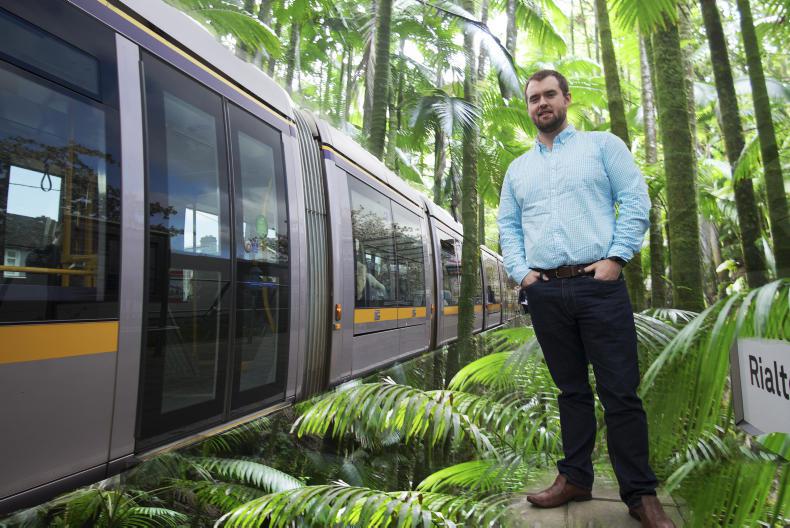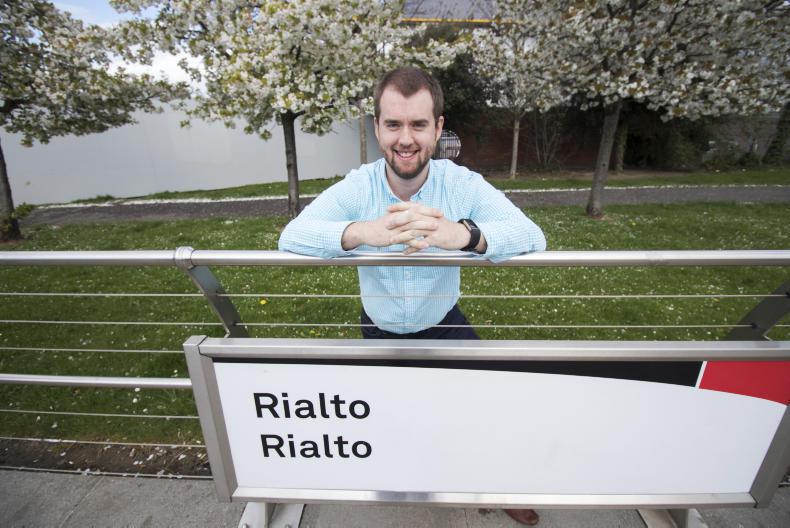Although born and reared in the heart of Dublin city (Rialto, to be precise) Leighton Hoban has spent most of his career in extremely rural parts of the world in the tropics. Leighton is country manager for Fyffes in Belize, and tells us he always liked the great outdoors and “didn’t want to spend the majority of my time in an office”.
His desire to work out in the open air saw him go to UCD to study forestry. During his degree, he went to Madagascar for four months on work placement – “in the middle of nowhere” – working for a former UCD student who was the general manager of the Madagascar region for the World Wildlife Fund (WWF).
“The WWF had been managing tracts of land like national parks for the country, so the government founded an organisation to take over and look after the parks, like a forestry service,” Leighton says. “We were doing GPS coordinates or lineating land, marking borders to show the separation between the WWF land and what they’re going to be managing.”
Leighton says it was really, really, wild – in a good way.
“To get to the town where I was based, you got this old rickety truck that was turned into a kind of passenger bus.”
They did two days of non-stop driving on a road that had massive pot holes. “It was really, really rural, then we got a little pickup car, you’d all sit in it, drive for another three hours and then from there you had to walk 30km. And then you’re only in the town close to the area you need to be in,” he says.
Working abroad
Leighton returned home for fourth year of college but the stint in Madagascar piqued his interest in working abroad. Halfway through fourth year, an email was sent to his class in UCD asking if anyone was interested in going to Central America and learning a new language; Fyffes were recruiting.
“I had done Spanish for the Leaving Cert, so I already had an alright level,” says Leighton.
He thought: “I wouldn’t mind going down just to see. I’m not fully sure what I want to do, so why not?”
Leighton and seven other candidates who reached the third round of interviews were brought to Costa Rica for five days, but only two of them were successful in getting positions. His career with Fyffes began with five weeks in Costa Rica on an intensive Spanish course. Then he was sent to Belize. “And that’s where I have been for the last five years.”
It is a very beautiful country, he tells us. “There’s no McDonald’s, so no fast food. There’s no large shopping centres, there’s nothing like that.”
The people are very nice as well, he says, and he is going out with a local Belizean girl. He tells us the best thing about living in Belize is the weather. “It’s warm, comfortable, it’s not too humid – there’s nothing better than waking up in the morning and having sun shining in.”
During wet season temperatures can drop to around the mid-20s – “nothing to complain about” – but temperatures can reach the 40s in dry season, “so it can be warm when you’re in the field. It can be fairly hard going.”
Forestry to bananas
While a degree in forestry and a career in banana production may seem an odd pairing, Leighton explains: “With forestry, it’s 20 years before you start harvesting, before you start generating any revenue; whereas with bananas, it’s nine months. But what’s so similar about them is they’re large-scale agriculture. Forestry is large scale and so is bananas, so having an idea of that scale of management is what helped me develop in what I’m doing now.”
He says: “There’s no course here to study bananas – maybe you could study horticulture – but it’s about taking what you studied and implementing it into what you’re doing, and trying to make the best of it.”
Leighton says he had to learn from the bottom, starting with digging drains, planting and fertilising.
“I was learning from the ground up. When you get to a high level and you’re dealing with people – clients or growers – you need to know what you’re talking about,” he says.
“If you don’t know what it’s like to put a plant in the ground or fertilise the plant or harvest the plant, you can’t discuss, you can’t negotiate, you can’t argue your point with people. And that’s how you generate respect as well, because people realise that you have done what you’re talking about.”
Leighton says it was hard graft as he worked from 5 in the morning until 8 in the evening six days a week for about seven or eight months. He then progressed into managerial roles, starting with field foreman. His next promotion was to an assistant manager role.
“I really got into the financial side of managing the farms, crop production, everything to do with producing bananas.”
Fyffes has a country manager for all of the countries it sources fruit from and Leighton’s next career move was into the role of deputy country manager for Belize. He was promoted a year later and has been country manager for two years. He has 29 people reporting to him in various departments, such as compliance and quality control and is also responsible for cool chain management: “Keeping the fruit cool, making sure it arrives in green state.”
Fresh fruit
He says it’s “terrible” if the fruit arrives yellow: “We need to make sure that fruit is harvested in the peak period or the optimum condition, to make sure it lasts the journey.”
It takes a little more than two weeks for the fruit to travel from Belize by boat.
“The shelf life is important and this is a perishable good,” says Leighton.
He also oversees material distribution, inventories – and port logistics.
“I have it split up into different areas. I have nine people in quality control, nine in materials, but I am constantly involved with them,” he says.
Communication is very important in his role. “I sometimes feel like a politician because it’s about talking to people, talking to the growers, explaining to them what our requirements are … talking to the market, finding out what the market wants and trying to gel them together so it works.”
Leighton says the job is demanding but “the rewards are there”. He says Fyffes is a “great company to work for” and that the company has a very low turnover rate: “The people that are in Fyffes stay in Fyffes.”
He says that with Fyffes, in five years he has gone from having “zero knowledge in bananas – nothing – to manning a multi-million euro source of fruit, and managing 29 people”.
He says the company is not ageist, pointing towards the amount of responsibility he’s been given at the ripe young age of 27.
“Fyffes recognise good people. Fyffes is a people company, so if it’s someone that’s putting in the effort and wants to develop themselves, the opportunities are there.” CL






SHARING OPTIONS